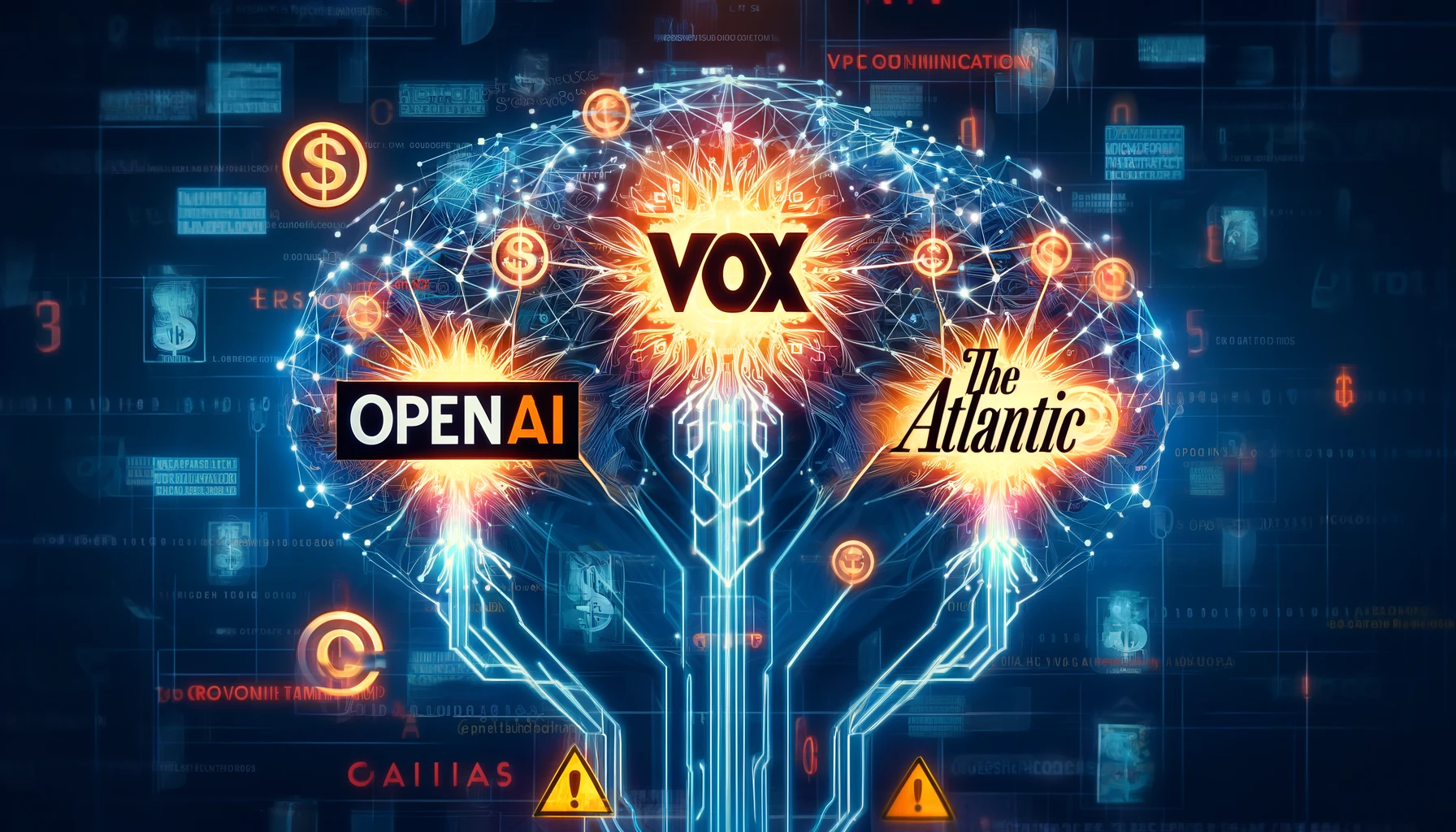On Wednesday, OpenAI, a company specializing in artificial intelligence (AI), announced partnerships with Vox Media and The Atlantic. These deals allow OpenAI to use news articles from these publishers to improve its AI models, including ChatGPT. This move follows OpenAI’s strategy to enhance the accuracy and reliability of its AI products.
What are the Partnerships About?
OpenAI’s agreements with Vox Media and The Atlantic are part of a broader effort to obtain current and reliable information for their AI products. This move follows similar partnerships with other major media companies like News Corp, which owns The Wall Street Journal and the New York Post. In total, OpenAI has signed deals with companies representing more than 70 newspapers, websites, and magazines.
The main reason for these partnerships is to make sure AI tools like ChatGPT provide accurate and trustworthy information. AI models sometimes generate false information, so using verified news sources helps improve the reliability of the AI’s responses. By incorporating fresh content from reputable news organizations, OpenAI aims to enhance the quality of information that users receive from its chatbots.
The Concerns and Benefits
There is a mix of reactions within the news industry about these partnerships. Some publishers are worried that as more people turn to AI for news, fewer will visit their websites, potentially reducing their revenue. However, others see this as an opportunity to earn money by licensing their content to AI companies.
Nicholas Thompson, the CEO of The Atlantic, stated, “We believe that people searching with AI models will be one of the fundamental ways that people navigate the web in the future.” This sentiment reflects the growing belief that AI will play a central role in how people access and consume information online.
Lawsuits and Legal Issues
Not all news organizations are happy with how AI companies use their content. Some, like The New York Times, have sued OpenAI for using their articles to train AI models without permission. These organizations argue that their work is being used without fair compensation, which they see as a violation of copyright laws.

OpenAI and other tech companies argue that using this content is legal under the concept of “fair use,” which allows for the reuse of material if it is significantly transformed. Despite this, OpenAI continues to seek direct agreements with publishers to avoid legal disputes and gain access to up-to-date content. These deals are seen as a way to avoid copyright lawsuits and ensure that content creators receive compensation for their work.
Details of the Agreements
The deals with Vox Media and The Atlantic are part of a series of partnerships OpenAI has established across the media industry. Vox Media’s deal includes content from its various publications such as The Verge, Vox, New York Magazine, Eater, and SBNation. Similarly, The Atlantic will share its articles and other content with OpenAI. The specific terms of these deals were not disclosed, but they are part of a trend where media companies collaborate with tech firms to leverage AI technology.
OpenAI has also signed deals with other major media companies, including Axel Springer (which owns Business Insider and Politico), DotDash Meredith (which owns People, Better Homes & Gardens, Investopedia, and InStyle), the Financial Times, and The Associated Press. The financial terms of these agreements vary, with News Corp’s deal estimated to be worth $250 million over five years, while the deal with the Financial Times is believed to be worth between $5 to $10 million.
Impact on the News Industry
These partnerships represent a significant shift in the relationship between technology companies and news organizations. Some news outlets, like those owned by Alden Global Capital, have opted to sue AI companies over the use of their content, joining a broader group of authors, artists, and musicians who are challenging what they see as unauthorized use of their work. On the other hand, companies like Vox Media and The Atlantic are choosing to work with OpenAI, hoping to benefit from the technological advancements and financial opportunities that come with such collaborations.
Both Vox Media and The Atlantic have plans to utilize OpenAI’s technology beyond just content sharing. Vox Media aims to enhance its affiliate commerce product, The Strategist Gift Scout, and expand its advertising platform, Forte, using AI tools. The Atlantic is developing a microsite called Atlantic Labs, where it can experiment with AI tools to better serve its journalism and readers.
This article is based on the following articles:
https://www.washingtonpost.com/technology/2024/05/29/openai-vox-the-atlantic-news-deals
https://www.theverge.com/2024/5/29/24167072/openai-content-copyright-vox-media-the-atlantic

Background Information
What is Artificial Intelligence (AI)?
Artificial Intelligence, or AI, refers to the development of computer systems that can perform tasks usually requiring human intelligence. These tasks include learning from data (machine learning), understanding natural language (natural language processing), recognizing patterns (such as in images or sounds), and making decisions. AI systems can be found in many applications, from virtual assistants like Siri and Alexa to more complex systems like self-driving cars and diagnostic tools in healthcare.
Understanding OpenAI
OpenAI is a research organization and technology company focused on creating and promoting friendly AI for the benefit of all humanity. Founded in December 2015, OpenAI aims to ensure that artificial general intelligence (AGI) benefits everyone. One of OpenAI’s most well-known products is ChatGPT, a language model that can generate human-like text based on the input it receives. This tool can answer questions, provide information, and engage in conversations on a wide range of topics.
What is ChatGPT?
ChatGPT is a type of AI called a “language model,” developed by OpenAI. It has been trained on a large amount of text data from the internet, allowing it to generate responses to text inputs in a conversational manner. However, because the data it was trained on includes vast amounts of information from various sources, it sometimes generates inaccurate or misleading information. This is why it’s important for ChatGPT to access reliable and up-to-date content from trustworthy sources.
Why are Media Partnerships Important for AI?
For AI tools like ChatGPT to provide accurate and trustworthy information, they need access to high-quality, up-to-date content. This is where media partnerships come in. By partnering with reputable news organizations, AI companies can integrate reliable news articles directly into their AI models. This helps ensure that when users ask for information, the AI provides them with accurate and relevant responses.
The Role of Media Companies
Media companies, such as Vox Media and The Atlantic, produce and distribute news and information across various platforms. They employ journalists and editors who research, write, and verify news stories to ensure accuracy and reliability. These organizations often operate on a business model that includes advertising revenue, subscription fees, and sometimes licensing agreements.
Why are Some News Organizations Concerned?
While partnerships with AI companies can provide financial benefits and new opportunities for media organizations, they also raise concerns. One major worry is that as more people use AI to get their news, fewer people will visit news websites directly, reducing traffic and potentially harming advertising revenue and subscription sales. Additionally, some news organizations are concerned about copyright issues, as they believe their content is being used without proper compensation.
What is Copyright and Fair Use?
Copyright is a legal concept that gives creators of original work exclusive rights to their content. This means they can control how their work is used and distributed. However, there is a concept called “fair use” in copyright law, which allows limited use of copyrighted material without permission from the rights holders, under certain conditions. This can include use for purposes like criticism, comment, news reporting, teaching, scholarship, or research. The debate arises when determining whether AI training on large amounts of web data falls under fair use.
The Impact of AI on Journalism
AI is transforming many industries, including journalism. AI tools can help journalists by automating repetitive tasks, analyzing large datasets, and even writing basic news stories. However, the integration of AI in journalism also poses challenges, such as the potential loss of jobs and the ethical implications of AI-generated content. As AI becomes more advanced, finding a balance between leveraging technology and preserving the integrity of journalism is crucial.
The Future of AI and Media Partnerships
As AI continues to evolve, partnerships between AI companies and media organizations are likely to become more common. These collaborations can provide mutual benefits: AI companies get access to reliable content, while media organizations receive financial compensation and technological advancements. However, ongoing discussions about the ethical use of content, fair compensation, and the role of AI in society will shape the future of these partnerships.

Debate/Essay Questions
- Will the increasing use of AI for news consumption harm traditional journalism and reduce the number of professional journalists?
- Should news organizations be more concerned about potential revenue losses from AI use, or should they focus on the benefits of reaching a wider audience through AI platforms?
Please subscribe to Insight Fortnight, our biweekly newsletter!
